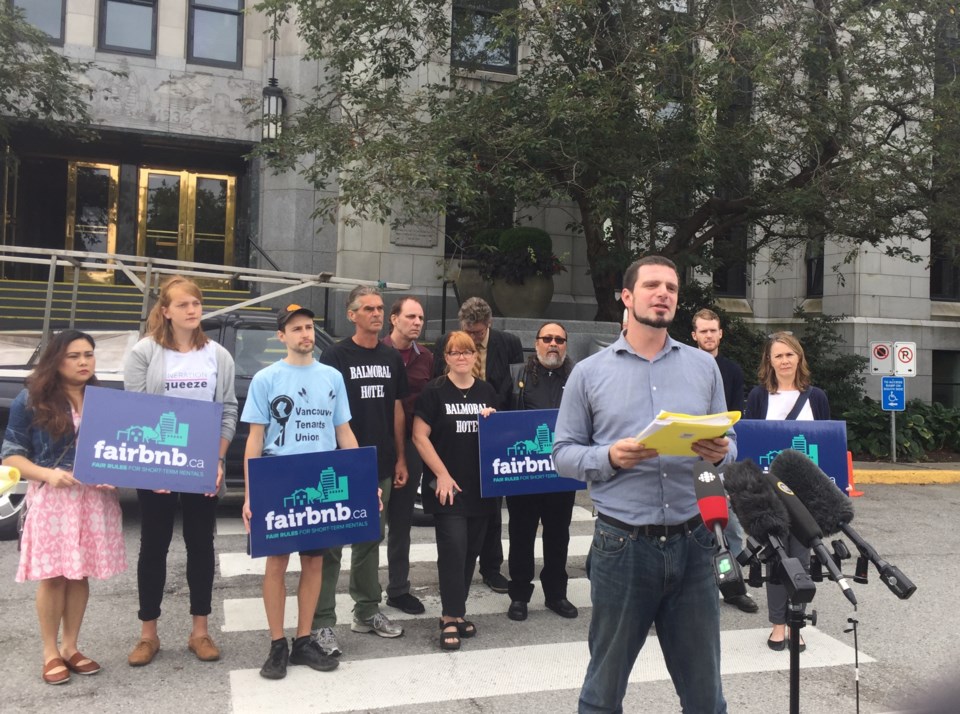A coalition of local groups is calling for the City of Vancouver to hold short-term rental sites, such as Airbnb and VRBO, accountable for illegal listings.
The group, which includes Mole Hill Community Housing Society, Generation Squeeze, LandlordBC, Vancouver Tenants Union, Downtown Eastside SRO Collaborative and Unite Here! Local 40, B.C.’s union representing hotel and hospitality workers, released a report on behalf of the national “Fairbnb” coalition demanding that the city add a clause to its proposed short-term rental regulations that would hold online platforms directly accountable for illegal listings.
“First of all we want to commend the City of Vancouver’s regulations that protect secondary suites as part of their proposed regulations here in Vancouver,” said Octavian Cadabeschi, a research analyst with Unite Here Local 40. “However, as our report will indicate, even the best regulations are ineffective without a proper enforcement mechanism.”
In its report, Fairbnb states that in cities where similar regulations have been put into place, illegal listings have continued to multiply.
“That’s why San Francisco and Toronto are adopting a policy to licence platforms and that’s why we demand that this city include a system for licencing and, if necessary, for fining platforms like Airbnb if they list illegal listings,” Cadabeschi said.
San Francisco recently settled a lawsuit with Airbnb and HomeAway paving the way for the city to require the online short-term rental platforms to ensure that all listings in the city are legal and properly registered.
Cadabeschi said Toronto is also in the process of bringing in similar requirements.
“The point is that it’s currently illegal to rent your suite for less than 30 days and it’s reliant upon the operator to try and obey that bylaw and the city hasn’t been able, really, to enforce that. If they’re going to make a new bylaw and not change those terms then the same thing is going to happen,” said Quentin Wright, executive director at Mole Hill Community Housing Society.
He added that regulations are needed to ensure online platforms are only listing legal, licenced listings.
“And then the city should be able to meet their policy goals,” Wright said. “Otherwise it will fail.
“I really want to strongly urge city staff and city council to read this report and understand what its conclusions are. I think it’s really key to the success to the proposed changes in regulations.”
“Regulation is great. Enforcement of regulation is really critical and that’s the never-ending challenge here,” said David Hutniak, CEO of LandlordBC, a professional association for owners and managers of rental housing.
“Vancouver is in a housing crisis and full-time Airbnb listings are part of the problem,” said Liam McClure, a tenant advocate for the Vancouver Tenants Union, which formed earlier this year.
He added that, despite being illegal, the growth of full-time, entire-home short-term rental listings are outpacing new housing availability by more than 100 per cent in some areas of the city.
“While we welcome the City’s effort to regulate Airbnb, allowing tenants to legally supplement out-of-control rental costs, the City’s proposed approach appears to be setting itself up for failure,” he said.
For its part, Airbnb said it’s been cooperating with Vancouver as it works toward regulating short-term rentals in the city.
“Airbnb welcomes the City of Vancouver’s move toward regulating home sharing and from the start we have worked closely with the city, including sharing data and removing listings that did not meet the standards and priorities of our community,” said spokesperson Lindsey Scully.
The company criticized the Fairbnb report, saying the group is funded by the hotel industry.
“Fairbnb and others consistently misrepresent Airbnb’s position, so let us be clear: Airbnb wants to be regulated, and we have always advocated for fair, sensible home-sharing regulations and look forward to continuing our collaborative relationship with the City of Vancouver,” Scully said.
“Airbnb helps make housing more affordable for young people, seniors and families in Vancouver, who depend on home sharing to pay their rent and stay in their homes,” she said. “More than 80 per cent of our hosts are sharing their primary residence a few times a month to help make ends meet.”
City staff presented the proposed regulations to council in July and elected officials will consider the bylaw at a public hearing this fall.
As currently proposed, the regulations would include a series of requirements:
- Operators of short-term rentals must obtain an annual $49 business licence and pay a one-time “activation fee” of $54.
- Short-term rental services such as Airbnb and Expedia will apply a transaction fee of up to three per cent, which would be remitted to the city to help fund the administration and enforcement of licensing operators of rentals.
- Have all operators and service providers pay applicable federal and provincial taxes. Also, have provincial and federal governments take steps to ensure operators pay sales and income tax.
- Operators must list their business licence number on the short-term rental site.
- Operators are required to comply with building safety, “neighbourhood fit,” and advertising and booking requirements.
The proposed regulations don’t allow secondary residences to be used for short-term rentals. Legal secondary suites or laneway homes that are not principal residences, or illegal secondary suites, are also prohibited.
If approved, the bylaw would be enacted in spring 2018.



